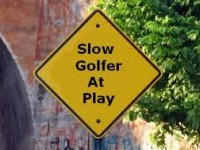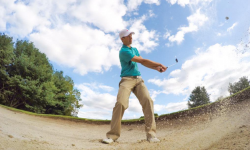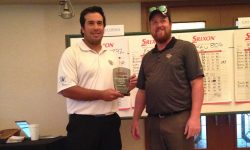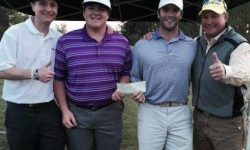It’s a tournament round and you’re off to a rough start after lipping out a four-footer for par. Only compounding the frustration, there is a multi-group back up on the next par three, the hole that always seems to slow us golfers down, and you are forced to ponder how that par putt didn’t hold the break. Instead of removing the missed putt from your memory—a skill all good golfers possess—it lingers as you wait for the groups in front of you to finish the hole. Slow play is a serious problem for beginner golfers, those playing college golf, all the way to PGA Tour players (remember Kevin Na and his trouble pulling the trigger?), and all golfers need to hold one another accountable to speed up our collective pace of play.
When asked about the problem of slow play, Tiger Woods noted that it’s not just tour players, but “College golf has gotten incredibly slow. It's so bad that now we are giving the guys the ability to use lasers [for yardages] to try to speed up play, and they are still 5:45, six hours-plus." I’ve seen it myself too most recently at NCCGA Nationals at Sea Island where there were three groups waiting to tee off on the par 3 third hole.
While the beautiful views on a sunny day at Sea Island mitigated the pain of slow play, many NCCGA students were displeased with how long the 5:30 round took. Let’s face it, we all live busy lives and while spending an entire day on the golf course sounds great in theory, it makes getting homework and other life tasks accomplished difficult. Having played in too many six-hour golf tournaments myself, I’ve noticed that if the group in front of me is slow, players in my group will slow down to compensate and thereby exacerbate the plague that is slow golf to permeate the entire course.
So to help speed up play in both NCCGA and Nextgengolf tournaments, consider the following:
- One player can slow up a group that can slow up an entire course
- Playing slowly makes golf harder! Some golfers think too much about shots (this used to be me until I realized that trying less actually freed me up mentally) and let their heads get in the way. Just get up and hit it!
- Watch your ball carefully after you tee off and if you miss the fairway, pick a tree or bunker so you can find the ball quickly
- Always hit a provisional tee shot if you think there is even a slight chance you won’t find your ball; nothing is worse than the old walk of shame back to the tee (you college students who have been lucky enough to spend a night elsewhere know what it feels like walking to the dining hall that next morning with a hangover…)
- Most importantly, if someone is playing slowly in your group, don’t be afraid to politely ask them if they will pick it up!
Let’s all play better, faster golf with Nextgengolf and NCCGA in 2013.
<p style="text-align: center;"><a href="https://nccga.org/ready-golf/" target="_blank">Learn about the NCCGA's #ReadyGolf Policy</a></p>
<em><strong>**Mike Belkin is a Co-Founder of Nextgengolf. Contact Mike on Twitter @MikeBelkin11</strong></em>




